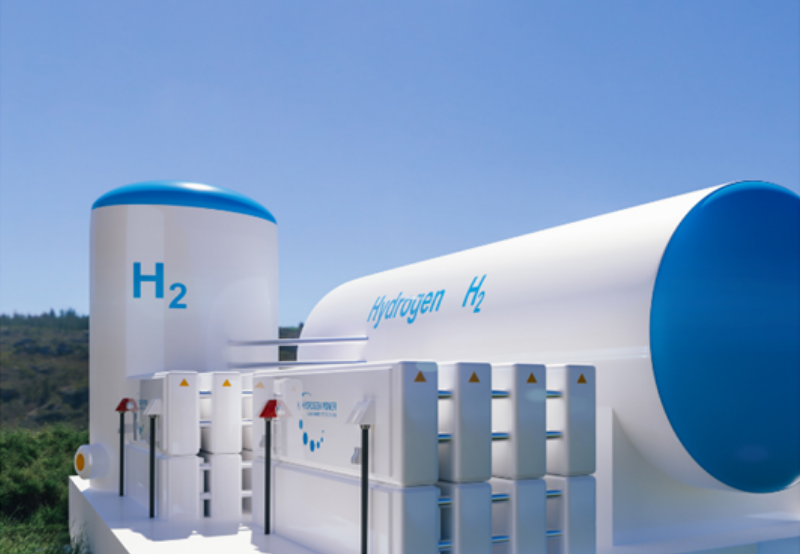India has taken a huge step towards a greener and cleaner tomorrow with the launch of its first-ever Multi-purpose Green Hydrogen Pilot Project by SJVN Limited. This cutting-edge facility is located at SJVN’s 1,500 MW Nathpa Jhakri Hydro Power Station in Jhakri, Himachal Pradesh, and it’s all set to change the way we think about energy. So, what’s the big deal about this new project? Well, the green hydrogen produced here will do two important things. First, it will power the High Velocity Oxygen Fuel Coating Facility at the power station, providing the fuel it needs to run. And second, it will generate electricity through a fuel cell with a capacity of 25 kW, helping to meet India’s ever-growing energy demands. On April 24, 2024, Smt. Geeta Kapur, the Chairperson and Managing Director of SJVN Limited, inaugurated the nation’s first Multi-purpose Green Hydrogen Generation Plant. She explained that this project is part of the National Green Hydrogen Mission of the Government of India, aimed at boosting green hydrogen production in the power sector and establishing it as a clean energy source.
This cutting-edge facility is engineered to generate 14 kilograms of green hydrogen daily, operating for 8 hours each day. The hydrogen will be stored at a pressure of 30 bars in six storage tanks, with a total capacity of 12 cubic meters. And the best part? The project will use an alkaline electrolyzer powered by renewable energy from SJVN’s 1.31 MW Solar Power Plant in Wadhal, Shimla, to produce the hydrogen. The green hydrogen produced here will also be used for High Velocity Oxygen Fuel Coating of turbine underwater parts, showing just how versatile this technology can be in industrial processes.
Smt. Kapur inaugurated a Centralized Operation system for the 1,500 MW Nathpa Jhakri Hydro Power Station and the 412 MW Rampur Hydro Power Station. She demonstrated the successful implementation of the Tandem Operating System between the two power stations by remotely operating Unit-2 of Rampur HPS from the Nathpa Jhakri Control Room.Shri Manoj Kumar, the Head of Project at Nathpa Jhakri, Shri Vikas Marwah, the Head of Project at Rampur, Shri Harish Kumar Sharma, the Head of the Electrical Design Department, along with senior officials from all three locations, attended the inauguration events.
SJVN’s green hydrogen initiative is a big step towards a sustainable energy future for India. By using renewable energy sources and innovative technologies, the company is paving the way for a cleaner and greener tomorrow. This project shows India’s commitment to moving away from traditional energy sources and achieving its climate change goals.
Green energy is transforming India’s energy landscape, reducing our dependence on fossil fuels, and helping to fight climate change. With a growing population and booming economy, India’s energy needs are increasing rapidly, and green energy solutions are crucial to sustainably meeting these demands. The energy generated from renewable sources like solar, wind, and hydrogen can be used to power homes, industries, and transportation systems, reducing the strain on traditional energy sources and minimizing environmental impact. According to the latest data, as of March 31, 2024, India’s installed renewable energy capacity (excluding large hydropower plants with a capacity of 25 MW or above) stands at an impressive 143.64 GW. This figure doesn’t include an additional 47 GW of large hydropower capacity, showing the nation’s commitment to harnessing its renewable energy potential.
The Indian government has set ambitious targets for renewable energy generation, aiming to achieve 450 GW of installed renewable energy capacity by 2030. Currently, solar and wind power are the major contributors to India’s renewable energy mix, but projects like the Green Hydrogen Pilot Project are paving the way for diversification and innovation. India has seen a surge in green projects across various sectors, including solar parks, wind farms, hydroelectric power plants, and biofuel production facilities. Several state governments have introduced policies and incentives to encourage the adoption of renewable energy sources. The central government has also launched initiatives like the National Solar Mission and the Green Energy Corridor to help integrate renewable energy into the national grid.
With initiatives like SJVN’s Green Hydrogen Pilot Project and the government’s commitment to sustainable development, India is well on its way to becoming a global leader in the renewable energy sector. India is tackling its energy requirements and supporting the global fight against climate change by shifting away from traditional energy sources to green alternatives, aiming to protect our planet for future generations























